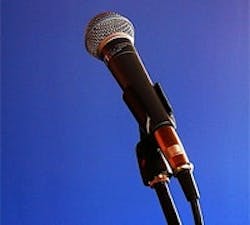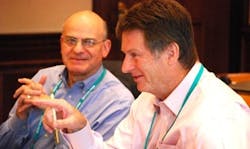Straight Talk from the Emerson Executive Suite
"Emerson's management is a bunch of engineers, and we're from the Midwest," began Peter Zornio, chief strategic officer, Emerson Process Management, "and Emerson's Chairman David Farr doesn't mince words either."
"Yes, it is in our Emerson culture to be very straightforward," added Emerson Process Management President Steve Sonnenberg, as his predecessor, John Berra, looked on and nodded.
Emerson's top executives took an hour to have a frank discussion about the economy, trends in the industry and the Emerson brand and culture with Control's Walt Boyes and Keith Larson this week at the 2009 Emerson Global Users Conference in Orlando.
Boyes started the interview by asking Sonnenberg, "This past year has been more of a challenge than you hoped your first year as Business Leader would be. What do you think your high points and low points have been?"
"Well, the low points have been the economy, of course," Sonnenberg replied. "When our sales stopped, and orders just went off the cliff, that was hard. The high point, frankly, is this meeting. This week I've seen our customers getting their confidence back, and we're seeing signs that projects are getting back on track and that our customers believe the recession is over."
"Is the economy really recovering, or are we in for a ‘dead-cat bounce'?" Boyes asked.
"We're recovering," Sonnenberg said. "We're at the bottom in the housing market, the banks are stable again and customers are waking up. Of course, if I really knew the answer to that, I'd be a very rich man. Nobody predicted the start of this thing either. But I don't think there'll be a ‘dead cat bounce.'"
"There is a ‘triple witching hour' going on right now," Boyes said. "We have a low dollar, very-cheap credit and the price of oil is staying reasonably high. Do you see the oil and gas companies taking advantage of that trifecta to take some of those very large dollar value projects off the shelf and begin procurement?"
"Yes, that's exactly what we're seeing," Sonnenberg said. "The oil companies are looking at the price of steel and knowing that the price of oil is going to go up further, and they're trying to time exactly when they should make these investments, and we're starting to see projects."
"Well, there's a basic knowledge requirement that is needed for decision-support systems to work," Zornio said. "I would hope that providing that level of knowledge would be done by somebody like ISA. That's where ISA could be making its most significant contributions."
"There's a part of the puzzle that is very centered on the individual plant, though," Control's Larson pointed out.
"Yes," John Berra said, "which is why we're seeing a push toward having simulation alongside the control system and, regardless of how long you've worked there, you're being required to use the simulator on processes and problems that don't occur often."
"Like pilots do," Boyes said. "Exactly," Berra replied.
"Do you think that Emerson and other companies will find themselves forced to do basic training and outsource technicians and operators?"
"Most of our customers don't want to outsource staff," Berra said. "They want to keep that in-house."
"The refineries have been supporting schools such as Lee College in Baytown, Texas," Zornio said, "and the paper industry used to run its own school before the industry cratered in the U.S., so it may come again."
"Emerson hasn't jumped on the sustainability bandwagon as hard or as publicly as some of your competitors and your owner-operator customers have. Is there a reason for that?" Boyes asked.
"It's cultural," Sonnenberg said. "We're really very matter of fact, and the fact is, everything we do is about sustainability. That's what automation is. It's very easy to buy a bunch of green shirts and a palm tree and go to exhibits touting how green you are, but in the final analysis, our customers are very smart, and they can see through stuff like that. It is better to do, and say later."
"And we've been doing sustainability for many years," Berra added.
Boyes said, "The increasing maturity of wireless opens up some significant new possibilities for new ways to use sensors and new algorithms, like the new PID for Wireless. With the addition to the mix of the trend toward smaller, less-expensive sensors…nanosensors or, as I've called them, lick n' stick sensors…do you see this as another coming game changer?"
"First," Sonnenberg said, "you have to remember that there's more to a transmitter than just the transducer. I've seen lots of companies try to enter the industrial wireless market without any knowledge of how to design enclosures, user interfaces or gain approvals, and they just don't last."
"But there are opportunities to do things with sensors that further improvements in wireless will enable," Sonnenberg continued. "You just have to realize that most of the cost of a transmitter is in the housing, not the transducer."
"You've released some impressive new products here this week," Boyes said. "The new DeltaV S series with electronic marshalling makes products out of marshalling cabinets and pre-wired junction boxes for the first time. You've made definite improvements in device screens with human-centered design, and you've shown the astonishing XI as you're calling OPC.Net. Why bring out these new products in a recession?"
"It's always nice to have significant new products to talk about," Zornio said.
"The reason is that our customers have time to think, to consider what these new products will do for them and to plan their next moves," Sonnenberg said. "When times are good, most of our customers are really too busy to look at new things. This gives them the opportunity to consider the future."



